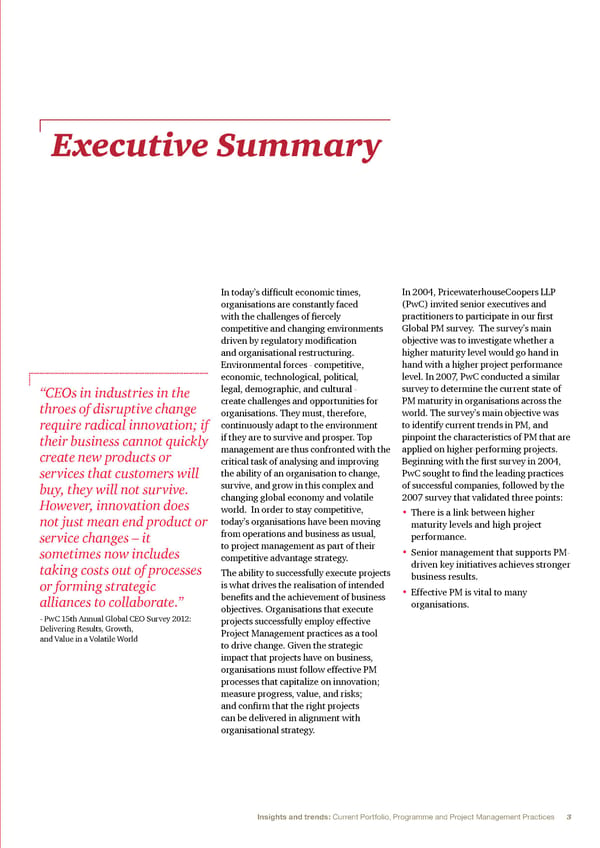Executive Summary In today’s difficult economic times, In 2004, PricewaterhouseCoopers LLP organisations are constantly faced (PwC) invited senior executives and with the challenges of fiercely practitioners to participate in our first competitive and changing environments Global PM survey. The survey’s main driven by regulatory modification objective was to investigate whether a and organisational restructuring. higher maturity level would go hand in Environmental forces - competitive, hand with a higher project performance economic, technological, political, level. In 2007, PwC conducted a similar “CEOs in industries in the legal, demographic, and cultural - survey to determine the current state of throes of disruptive change create challenges and opportunities for PM maturity in organisations across the organisations. They must, therefore, world. The survey’s main objective was require radical innovation; if continuously adapt to the environment to identify current trends in PM, and their business cannot quickly if they are to survive and prosper. Top pinpoint the characteristics of PM that are create new products or management are thus confronted with the applied on higher-performing projects. critical task of analysing and improving Beginning with the first survey in 2004, services that customers will the ability of an organisation to change, PwC sought to find the leading practices buy, they will not survive. survive, and grow in this complex and of successful companies, followed by the However, innovation does changing global economy and volatile 2007 survey that validated three points: world. In order to stay competitive, • There is a link between higher not just mean end product or today’s organisations have been moving maturity levels and high project service changes – it from operations and business as usual, performance. sometimes now includes to project management as part of their • Senior management that supports PM- competitive advantage strategy. driven key initiatives achieves stronger taking costs out of processes The ability to successfully execute projects business results. or forming strategic is what drives the realisation of intended • Effective PM is vital to many alliances to collaborate.” benefits and the achievement of business organisations. objectives. Organisations that execute - PwC 15th Annual Global CEO Survey 2012: projects successfully employ effective Delivering Results, Growth, Project Management practices as a tool and Value in a Volatile World to drive change. Given the strategic impact that projects have on business, organisations must follow effective PM processes that capitalize on innovation; measure progress, value, and risks; and confirm that the right projects can be delivered in alignment with organisational strategy. Insights and trends: Current Portfolio, Programme and Project Management Practices 3
 Insights and Trends Page 3 Page 5
Insights and Trends Page 3 Page 5